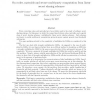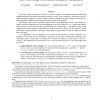111 search results - page 4 / 23 » Characterization of Secure Multiparty Computation Without Br... |
CORR
2008
Springer
13 years 5 months ago
2008
Springer
We present three voting protocols with unconditional privacy and information-theoretic correctness, without assuming any bound on the number of corrupt voters or voting authorities...
CRYPTO
1995
Springer
13 years 9 months ago
1995
Springer
Abstract. In this paper we present an eficient protocol for “Committed Oblivious Transfer” to perform oblivious transfer on committed bits: suppose Alice is committed to bits 0...
FC
2010
Springer
13 years 9 months ago
2010
Springer
Abstract. For the homomorphic Paillier cryptosystem we construct a protocol for secure modulo reduction, that on input of an encryption x with x of bit length x and a public ‘mod...
CRYPTO
2005
Springer
13 years 11 months ago
2005
Springer
Error correcting codes and matroids have been widely used in the study of ordinary secret sharing schemes. In this paper, we study the connections between codes, matroids, and a s...
STOC
2007
ACM
14 years 6 months ago
2007
ACM
A zero-knowledge proof allows a prover to convince a verifier of an assertion without revealing any further information beyond the fact that the assertion is true. Secure multipar...


